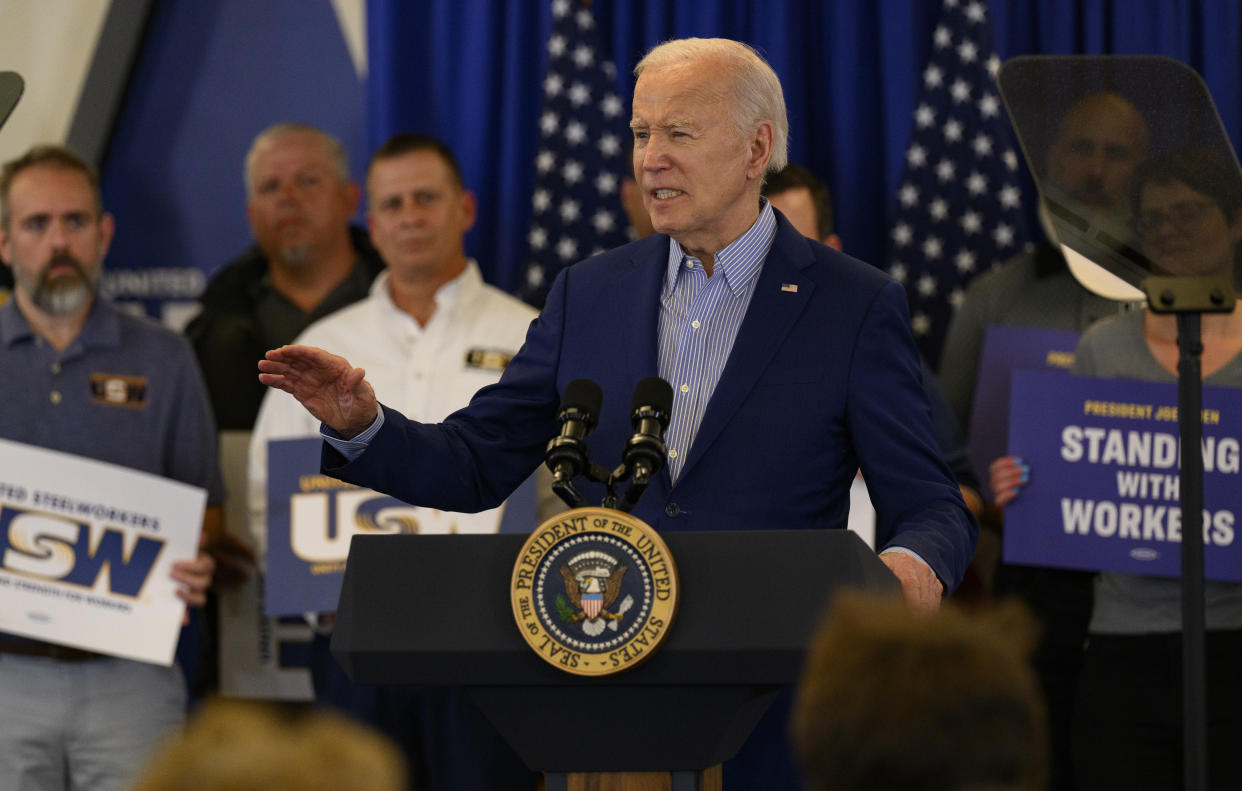Biden gets Trumpy on trade
Don’t expect him to admit it, but President Joe Biden has tacitly acknowledged that Donald Trump’s “America First” campaign strategy has a certain appeal.
Biden has borrowed a move from the former president and begun the process of hiking US tariffs on Chinese steel and aluminum imported to the United States. Biden wants to triple the tariff, from 7.5% to 22.5%, claiming that China undercuts market prices by subsidizing its domestic manufacturers.
Biden also says he’ll take new steps to prevent China from importing metals through third parties, such as Mexico, and investigate unfair Chinese practices in the shipbuilding industry.
Trump, who called himself “Tariff Man,” was the OG trade warrior, imposing new duties on hundreds of billions of dollars of imports during his four years as president. Numerous economic studies argued that the Trump trade war, including Chinese retaliation, did more harm than good to the US economy. Yet Biden left the China tariffs in place while removing other tariffs Trump imposed on nations friendlier to the United States.
What Biden is doing now is slightly Trumpy, but not the Full Trump. The former president, who’s running for another shot at the White House this year, used tariffs in an attempt to reduce the whole US trade deficit with China and boost American manufacturing across the board. Trump imposed tariffs ranging from 7.5% to 25% on about half of all Chinese imports to the United States, focusing mostly on component products. He exempted finished retail goods, where shoppers might readily notice price hikes as importers passed the new taxes onto consumers.
Biden’s approach is different. He never mentions the US trade deficit with China, instead taking a more targeted approach to sectors of the US economy he feels deserve protection. The green energy and semiconductor incentives Biden signed into law in 2022, for instance, were meant to boost domestic industries key to sustaining an economic edge. That approach prioritizes tax breaks for domestic production over penalties on importers. Biden has also banned US exports of advanced US electronics to China, mainly to hamstring China’s development of sophisticated missiles and other weaponry.
The new steel and aluminum tariffs are likely to be incidental, given that China only accounts for 2.1% of all imported steel and just 3.6% of imported aluminum. Prior sets of US sanctions have already addressed concerns, going back years, about China subsidizing metals and other favored industries and gaining global market share by undercutting market prices.
Drop Rick Newman a note, follow him on Twitter, or sign up for his newsletter.
Biden has made little use of tariffs so far in his presidency, and many economists who bemoan the distortions caused by protectionism hope it stays that way. Trump’s tariffs, for instance, may have had the desired goal of aiding targeted industries, but they hurt other industries by raising their costs.
A 2018 analysis by the Peterson Institute for International Economics found that a new Trump tariff on steel imports from nearly all countries would save or create about 8,700 steel industry jobs in the United States. But it would also raise the cost of steel, forcing purchasers such as automakers and other manufacturers to spend $5.6 billion more. The tariff basically transferred an economic benefit from steel consumers to steel producers, with each protected job coming at a cost of about $650,000. That’s a terrible bang for the buck.

The Trump tariffs caused other inefficiencies. Many Chinese exporters subject to the Trump tariffs simply shipped their goods to the United States through a third country, such as Vietnam, avoiding the tariffs while sending no additional production back to the United States. Trump also provided pathways to tariff exemptions for many producers, while raising or lowering the tariffs from time to time, creating a nightmarish compliance regime, illustrating why economists generally hate tariffs in the first place.
Still, protectionism is becoming a political necessity, as American politicians compete to show how far they’re willing to go to protect manufacturing jobs in the heartland. It’s no coincidence Biden announced the new China tariffs while on a campaign stop in Pennsylvania, one of the six or seven swing states that will decide the winner of this year’s presidential race.
Trump isn’t about to let Biden steal his crown as Tariff King. Trump says that if elected, he’ll pursue a new 10% tariff on virtually all imports from everywhere while slapping a new 60% tariff on imports from China. Where Biden wants to make the US economy less dependent on China in a few key sectors, Trump is more interested in decoupling the two economies completely.
Goldman Sachs recently reported that higher tariffs under a possible Trump administration “are perhaps the most important issue for the economic outlook.” The new tariffs Trump wants would raise significant amounts of government revenue while trimming economic growth, distorting supply chains, and depressing spending and incomes. Since new tariffs raise costs, they would also boost inflation, which wasn’t much of a problem before the COVID pandemic but certainly is now.
The best outcome on trade would probably be a lot of Trumpy bluster about tariffs and protectionism, to check the necessary rhetorical boxes, paired, in reality, with careful targeting of the sort Biden favors. That seems to be what Biden is attempting. He just needs to make sure voters who like the sound of it don’t confuse him for the other guy when they cast their votes.
Rick Newman is a senior columnist for Yahoo Finance. Follow him on Twitter at @rickjnewman.
Read the latest financial and business news from Yahoo Finance
